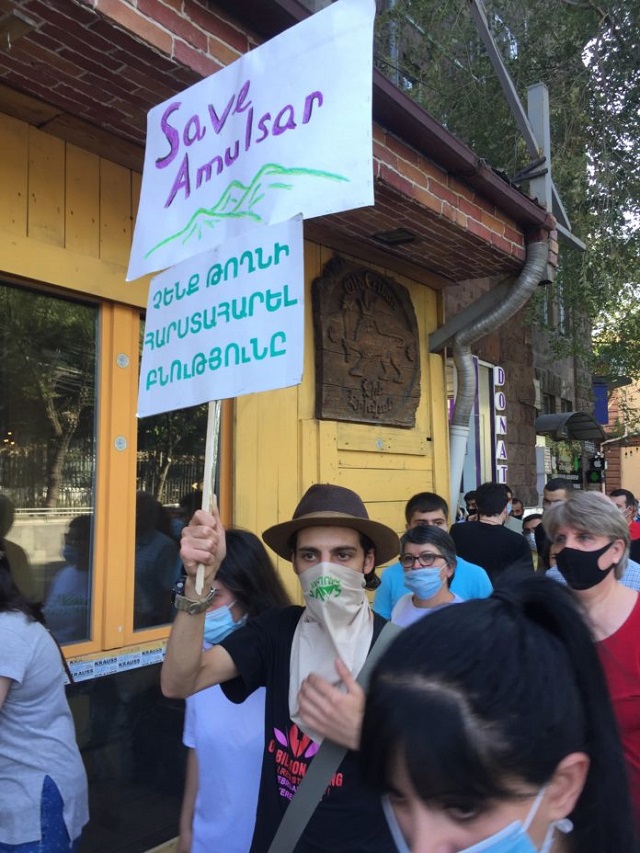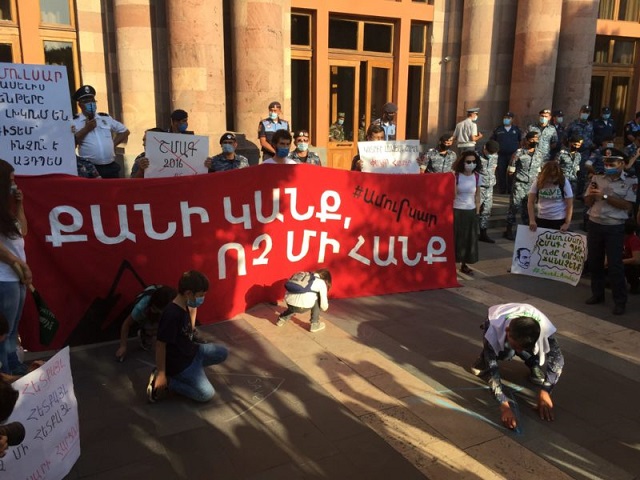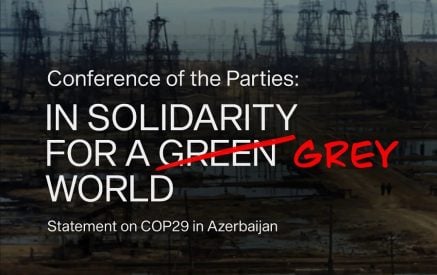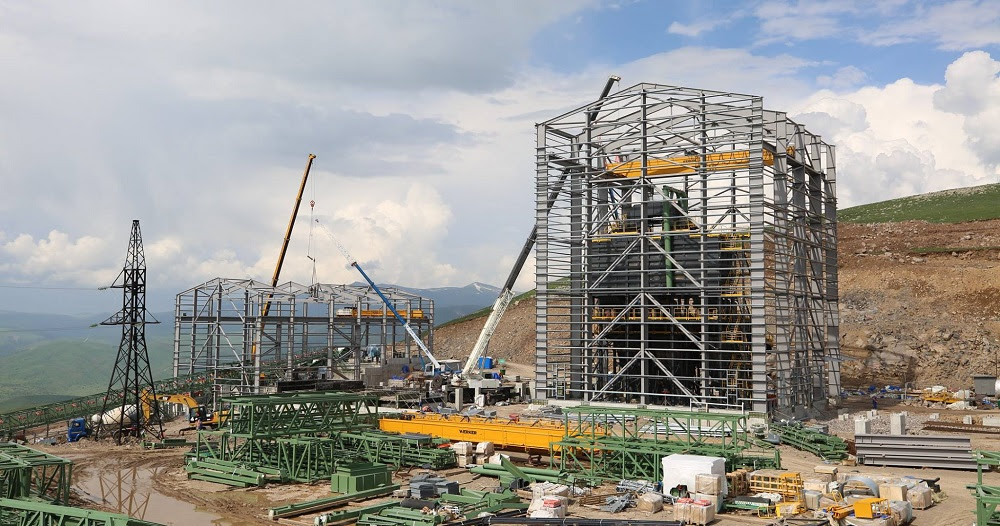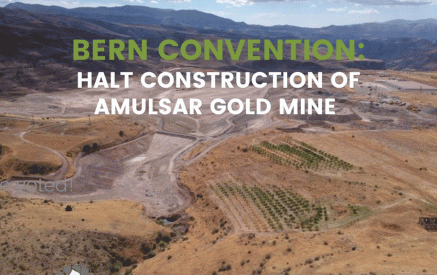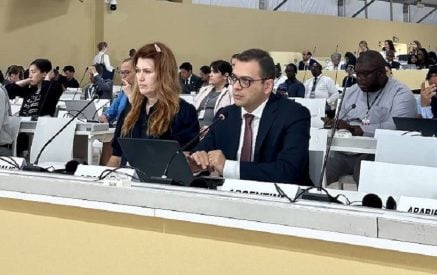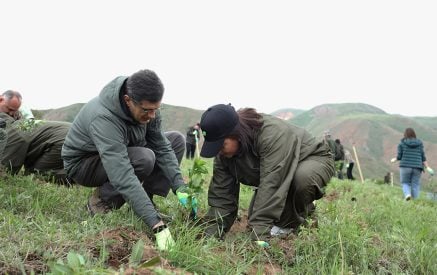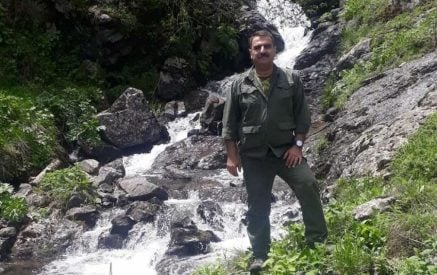The Armenian Mirror-Spectator. On August 20, a hot Thursday afternoon, scores of demonstrators from the Armenian Environmental Front (AEF) and the Save Amulsar movement assembled in front of the Armenian National Academic Theatre of Opera and Ballet. The rally was composed of Yerevan locals and a group of activists and concerned citizens from the southern resort town of Jermuk, who had travelled to Yerevan in a 200-car motorcade organized by Save Amulsar. The goal of the rally was simple: to raise awareness of the environmental threat to Amulsar, and to protest government inaction.
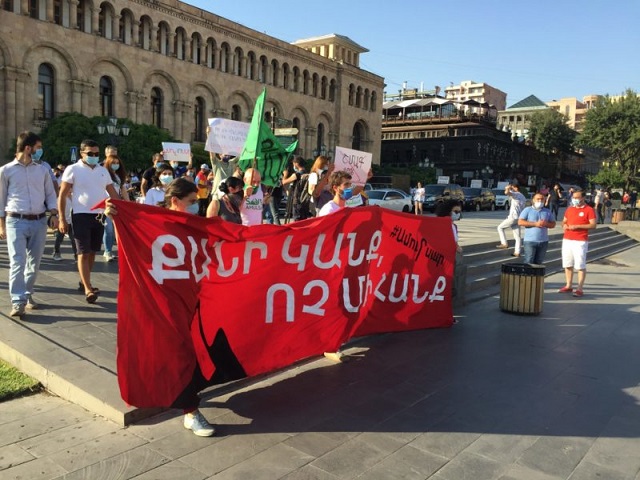
The bright red banner held up at Republic Square in Yerevan reads “As long as we exist, not one mine” (photo Mateos Hayes)
Delivering several speeches over megaphone and leading the crowds in chants of “Amulsar, Miayn Sar” (Amulsar must remain a mountain), the rally’s organizers led demonstrators on a march from the Opera down the sidewalks of Mashtots Avenue and past the shop fronts of Northern Avenue, before bringing the rally to the Armenian government’s front door on Republic Square.
AEF organizers repeatedly reminded attendees of the rally to respect social distancing and wear masks, and these rules were mostly observed.
Read also
Over the course of the rally, demonstrators were shadowed by a veritable army of Special Unit police officers who surrounded the peaceful demonstrators and blockaded the entrances to government buildings. Speeches were routinely interrupted by loudspeaker announcements from police patrol cars, reminding demonstrators to maintain social distancing and to don masks in accordance with the law. Rally goers in turn tried to drown out the PA announcements with the chanting of slogans and the sound of drums. Demonstrators from Jermuk were photographed by police officers, and a few individuals were ticketed for not wearing masks. All of this combined to produce a frosty government reception for the environmental activists.
Context
Amulsar is a mountain in southern Armenia which is the source of two major rivers. It is also the source of a network of dams and tunnels designed to feed Lake Sevan, the largest freshwater source in Armenia. A British mining firm, Lydian International Limited, discovered gold in Amulsar in 2006 and has been trying construct a mine there since 2016. Though it has yet to open, the Amulsar gold mine’s presence has coincided with the emergence of severe environmental crises in the surrounding region.
However, efforts to open a gold mine in Amulsar have met with stubborn resistance from the local population. Residents of Vayotz Dzor province — where the mine is to be opened — have been blockading the area around the mine since May 2018, preventing construction vehicles from accessing the site. Furthermore, they accuse Lydian of skirting environmental regulations, using improper business practices, and conducting corporate extortion.
Opponents of the mine believe that Lydian’s project has and will cause profound and irreversible environmental damage to their region and the country. They have made it clear that the only acceptable solution to this crisis is the total closure of the mine and the withdrawal of Lydian’s mining operations from the country.
Cause for Concern
Lydian’s entry into Armenia predates the Velvet Revolution. Despite immediate local resistance, Lydian pushed on, safe in the knowledge that any resistance to its operations would immediately be suppressed by local authorities. Blockades were attempted prior to the revolution but were quickly dismantled by police forces. But by 2018, the situation had changed drastically.
Armenia’s Velvet Revolution caused significant shifts in the status quo, ushering in Nikol Pashinyan’s premiership and promising a new era of democratization and transparency. Additionally, an uncontrolled explosion at the gold mine led to contaminated black water flowing from local taps. This was just one incident in a chain of environmental crises which emerged in the years following the commencement of construction. Since Lydian’s arrival in the region, repeated explosions at the mine have coated surrounding communities in dust. To make matter worse, the mine’s presence has severely disrupted local industries such as dairy farming, fisheries, and agricultural activities. The threat posed by the project to Armenia’s fresh water supplies continues to be a major concern, as noted by Armen Saghatelyan, director of the National Academy of Sciences of Armenia. Mining, Saghatelyan explains, can cause the release of acidic water and toxins, which can poison freshwater sources.
For the residents of Vayotz Dzor province, black water in their taps proved to be the straw which broke the camel’s back.
Catalyzed by the results of the peaceful revolution in Yerevan, local villagers began to organize resistance to Lydian. A round-the-clock blockade was put in place on the May 18, blocking roads leading to the mine. This time local police did not intervene, and the blockade continues to the present day and construction has halted. However, the crisis is far from resolved, as Lydian has now resorted to threats of arbitration. The mining company is considering litigation against Armenia in a $-billion investor state dispute settlement (ISDS). Such corporate court cases are often handled via a process of secret tribunals whose decision cannot be appealed. Since this means that Armenia – whose allotted government budget in 2020 was $4 billion— could face up to 2 billion dollars in fines, this threat has been quite a potent weapon for Lydian.
Government Response/ Political Division.
Following the 2018 Velvet Revolution, the government was generally uncooperative with Lydian. It refused to remove the blockade, and temporarily suspended Lydian’s rights to operate in Armenia, pending an environmental audit of the Amulsar mine by an international consultancy group. The consultancy group hired for this audit, Earth Link and Advanced Resources Development (ELARD), released its report to the public in a live teleconference in August of 2019. In summarizing its findings, ELARD found that the data collected by Lydian in surveys of Amulsar was insufficient for a mining project of the proposed size. Furthermore, it found that Lydian had used this incomplete data to make oversimplified and unsupported conclusions.
The report also found that the potential risks of water pollution were small and could be mitigated. In this vein, ELARD issued 16 recommendations for Lydian concerning mitigating measures. Following the release of the ELARD report, the Armenian government appeared to side with Lydian, as Prime Minister Nikol Pashinyan announced his intention later in August to restore rights of operation. Pashinyan argued that the ELARD report proved conclusively that the risks of water contamination were minimal and could be mitigated. To bolster these claims, the incumbent government pointed to the environmental audit’s 16 recommendations, and the fact that Lydian claimed to be working towards compliance with them.
Incidentally, there are past connections between the current government and Lydian. Current President Armen Sarkissian previously served as director of Lydian International Ltd. Amidst rumors that he remained a Lydian shareholder, President Sarkissian categorically denied any connections to Lydian in a conversation with protestors in 2018.
On the Ground
Disagreements continue to abound with regards to how ELARD’s report should be interpreted.
When speaking to rally goers this Thursday, the discord between the government and activists seemed palpable. Whereas Pashinyan’s government has argued that the ELARD report gives them no recourse to bar Lydian from operating in Armenia, the activists at the rally disagreed with that assertion. To them, the report was far from a glowing recommendation of Lydian’s operations, but was rather an indictment of their substandard practices. Activists also argued that the report indicated that Lydian had failed to enact necessary mitigating practices to reduce the risk of their mine causing environmental pollution. They saw no reason to trust that Lydian would now become compliant in its mining operations it hadn’t observed prior to the environmental audit.
Several people interviewed from both Jermuk and Yerevan said they wanted nothing less than the total cessation of the companies’ mining operations in the country. As Anna Nikoghosyan of AEF stated, “the government has all the necessary facts and reports to unconditionally close Lydian’s mine.” Nikoghosyan also pointed to Lydian’s dealings in Georgia and their lack of an established reputation as further red flags.
Prime Minister Pashinyan at one point supported the mine by stating that booting Lydian out of the country would reduce the incentive for foreign investment in Armenia. But the rally-goers were not swayed by this angle either. Levon Galstyan, a coordinator who has been with AEF for a decade and is a postgraduate candidate of the National Academy of Sciences, balked at this argument. Galstyan retorted, “I will support any foreign investment that brings growth to Armenia and builds its future. I will never accept however an investment that would poison our water, destroy our nature, and destroy our future in the name of profit. To me that is akin to selling one of my kidneys for a buck.” Garik, a demonstrator from Jermuk chimed in, saying “We all know this mine is a real threat to people’s health and to nature. We must defend our land and our mountains, as we have lost so much [land], we cannot lose more.”
Intersectionality
An interesting aspect of this rally was that it revealed a wide range of different causes finding common purpose in the Save Amulsar movement. Whilst the most prominent faction of demonstrators was environmentalists, the rally also included a significant number of LGBT+ activists. This issue resonates with other activist groups due to the common themes it shares. In their minds, the movement to save Amulsar is also a movement to preserve democracy, and to ensure the dignity and health of all human beings.
In other words, the rally-goers seek more than just to save a mountain: they seek to normalize a narrative in Armenian society that values the lives of people over profit, that elevates the voices of the voiceless, and calls to account those that abuse their power. As one self-proclaimed queer activist named Artak explained, “this movement affects all vulnerable people, and all those who oppose a lack of privacy, and police brutality.”
In the eyes of demonstrators, the post-revolution government had squandered a great deal of good will on this issue, not only by siding with Lydian, but also by remaining generally silent. As Nikoghosyan, an AEF activist, explained, “We are very disappointed with our government, our MPs, and our PM [Pashinyan]. They have had time to see the truth, but they aren’t holding Lydian accountable. This is quite embarrassing, and it shows that real democracy lives in Amulsar, not in Yerevan”.
Only time will tell if all that glitters is gold in the outcome of this crisis.
By Mateos Hayes
Special to the Mirror-Spectator




















































